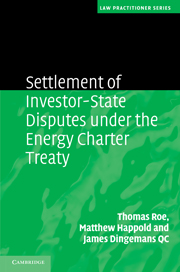Book contents
- Frontmatter
- Contents
- Foreword
- Preface
- Table of cases
- 1 Introduction
- 2 The applicable law
- 3 Availability of dispute settlement under Article 26
- 4 European Union law and the Energy Charter Treaty
- 5 Substantive law
- 6 Procedure
- 7 Contracting Parties' international responsibility for breaches of Part III of the ECT
- 8 Taxation
- Appendix A Selected provisions of the Energy Charter Treaty
- Appendix B Signatories to the Energy Charter Treaty
- Bibliography
- Index
7 - Contracting Parties' international responsibility for breaches of Part III of the ECT
Published online by Cambridge University Press: 05 July 2011
- Frontmatter
- Contents
- Foreword
- Preface
- Table of cases
- 1 Introduction
- 2 The applicable law
- 3 Availability of dispute settlement under Article 26
- 4 European Union law and the Energy Charter Treaty
- 5 Substantive law
- 6 Procedure
- 7 Contracting Parties' international responsibility for breaches of Part III of the ECT
- 8 Taxation
- Appendix A Selected provisions of the Energy Charter Treaty
- Appendix B Signatories to the Energy Charter Treaty
- Bibliography
- Index
Summary
Introduction
A Contracting Party is only liable for breach of Part III of the Energy Charter Treaty if it is responsible in law for the conduct constituting such breach. The general international law rules on state responsibility are customary in nature but have been codified by the International Law Commission. Articles 22 and 23 of the ECT make particular provision as to state responsibility under the Treaty. These are examined in this Chapter although it will be concluded that they do not ultimately change the applicable rules of attribution.
In addition, unlike most investment protection treaties, the ECT includes among its parties not only states, including all of the members of the European Union (EU), but also the EU itself, an international organisation. There is therefore a question as to whether conduct complained of by a claimant should be attributed to an international organisation alone, to or to one or more of that organisation's member states, or to both. Relevant to this question are the International Law Commission's draft Articles on the International Responsibility of International Organisations.
State responsibility under the ECT
The respondent to an investor's claim under an international investment treaty must invariably be a party to the treaty, that is (in almost all cases) a state. Equally invariably, in practice, the conduct of the state's response to a claim is in the hands of the executive branch of the state's national government, as the body responsible for the state's international relations.
- Type
- Chapter
- Information
- Publisher: Cambridge University PressPrint publication year: 2011



